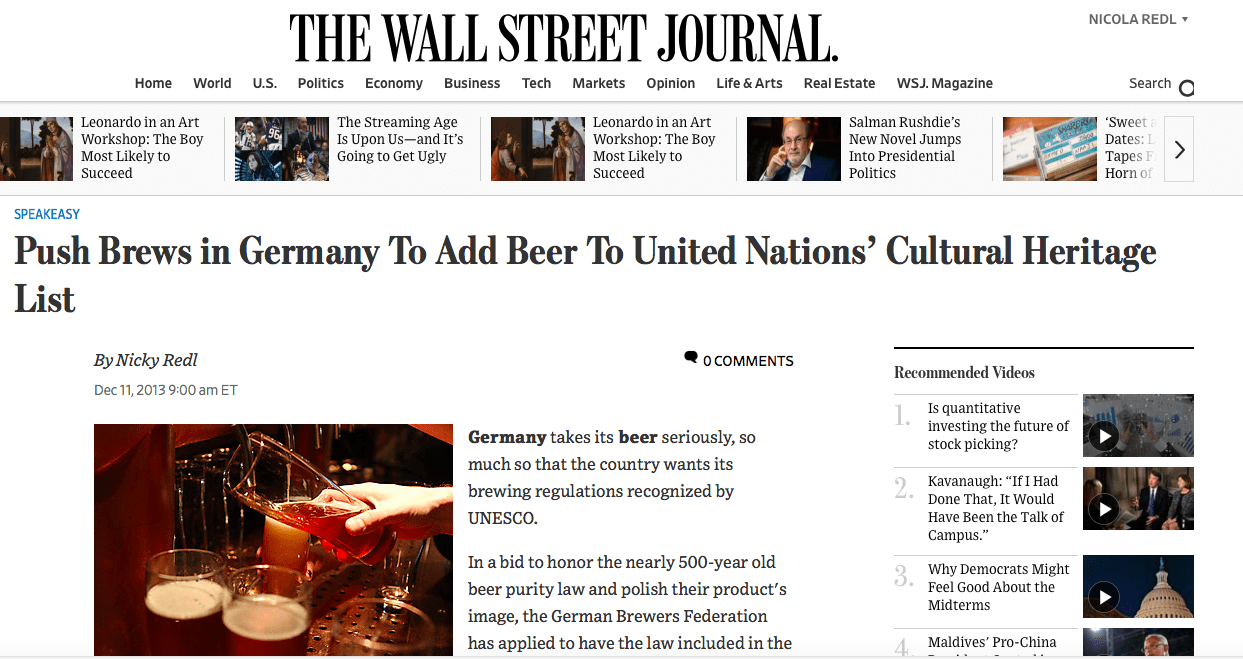Germany takes its beer seriously, so much so that the country wants its brewing regulations recognized by UNESCO.
In a bid to honor the nearly 500-year old beer purity law and polish their product’s image, the German Brewers Federation has applied to have the law included in the United Nations’ intangible cultural heritage list.
If successful, the purity law would join a diverse list of remarkable performing arts, social practices and traditional crafts. Also on the are the Mediterranean diet, Chinese calligraphy, Argentinian Tango, Italian violin craftsmanship and poetic dueling in Cyprus.
The president of the German Brewers Federation, Hans-Georg Eils, said inclusion would be a deserved acknowledgement.
“If Germany is still regarded as the undisputed beer nation, it owes this to the beer purity law,” he said.
While Germans are enthusiastic beer drinkers, the country isn’t the big consumer it once was. According to the Brewers Federation, Germans on average drank 105.5 liters per head last year, more than 10 liters less than in 2004. Overall beer sales declined 1.7% on the year in 2012 while exports were largely stable.
Being included on UNESCO’s cultural heritage list hasn’t necessarily made Croatian gingerbread baking more popular, but Mr. Elis believes it could be a boon to German beer’s image.
“I could imagine that the title could boost export chances,” he said.
Recognition could raise the profile of German beer internationally, said Krombacher brewery spokesman Franz-J. Weihrauch but he doubts it would buoy domestic demand, where demographic factors are at play.
“The aging population means there are fewer beer consumers,” he said.
A changing professional landscape also has an impact, according to Mr. Eils, because beer consumption was livelier when more people were engaged in hard physical labor.
A spokesman for Beck’s, Oliver Bartelt, said honoring history isn’t the answer to declining sales. Instead the values embedded in the brewing law, like high quality and tradition, have to be used more in marketing.
“We don’t just sell beer, we sell emotions through the brands,” Mr. Bartelt said.
Sales may be nothing to toast, but with more than 1,300 breweries creating over 5000 brands, Germany is still the biggest producer in Europe by far, with its closest rival the U.K. producing only around half the volume.
“Germany remains a beer nation,” Mr. Eils said.
Germany’s beer purity law went into effect in 1516 in the Bavarian town of Ingolstadt. It stipulates that only water, hops, malt and yeast can be used to brew beer. Prior to the law, other ingredients commonly used included ox bile, pine roots, wormwood, oak bark, bay leaves, and henbanes – a toxic herb that can cause hallucinations and affects the heart.
Only brewers working within the regulations can call their product German beer. Mr. Eils said using only natural ingredients requires a very high level of skill, as variations can’t be compensated for with chemical additives or preservatives.
The brewers hope their pitch for law to be added to UNESCO’s list will be approved in time for its 500 anniversary in 2016.
This article was published by The Wall Street Journal – Speakeasy on December 11, 2013.
